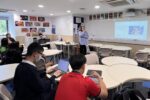be/longing with Christine Vicera and Daniella Subang
 “be/longing is a community arts-for-education lab that harnesses the transformative power of storytelling to cultivate and co-create cultures of inclusion for Hong Kong’s ethnically-diverse communities.” In our partnership with this organisation, Christine Vicera and Daniella Subang are leading a 6-workshop series with our students as a pilot project within our Wellbeing curriculum. Below, Christine shares what belonging means to her.
“be/longing is a community arts-for-education lab that harnesses the transformative power of storytelling to cultivate and co-create cultures of inclusion for Hong Kong’s ethnically-diverse communities.” In our partnership with this organisation, Christine Vicera and Daniella Subang are leading a 6-workshop series with our students as a pilot project within our Wellbeing curriculum. Below, Christine shares what belonging means to her.

What does the word ‘belonging’ mean to you?
To me ‘belonging’ is tied to our experiences of ‘being’ in a place, a space (not limited to physical spaces), or being part of different communities. Those experiences of ‘being’ point to our multiple and ever-changing identities which intersect to shape how we experience belonging.
Why does belonging matter?
According to Maslow’s hierarchy of needs, the sense of belonging is one of our major emotional needs as human beings. It’s what drives us to connect with the people around us. Simply put, belonging is important because we need each other.

What gives you a personal sense of belonging?
There are many things that give us a personal sense of belonging, and many things we do to create a sense of belonging, and for me it’s through my culture’s culinary practices and through music. I’m from the Philippines and for us, community is so important. Its importance can be seen through our language, too. I recall the prefix “ka-” used in Tagalog which means “to be with.” It’s used in words like “kaibigan” (friend), and even “katunggali” (rival). To me this says a lot about how important relationality, or connectedness with one another is in Filipino culture.
How can we create a sense of belonging for others in our community?
Unlike citizenship status, nationality, ethnicity, and some other markers of our identity, there is some agency we have in choosing where we belong and how others belong. We can create a sense of belonging for others in our community by holding space for each other, and for holding each other accountable for the times we let our unconscious biases get in the way of true inclusion and acceptance.


